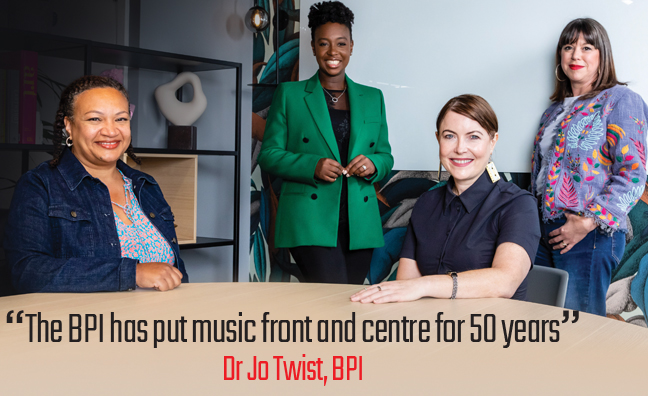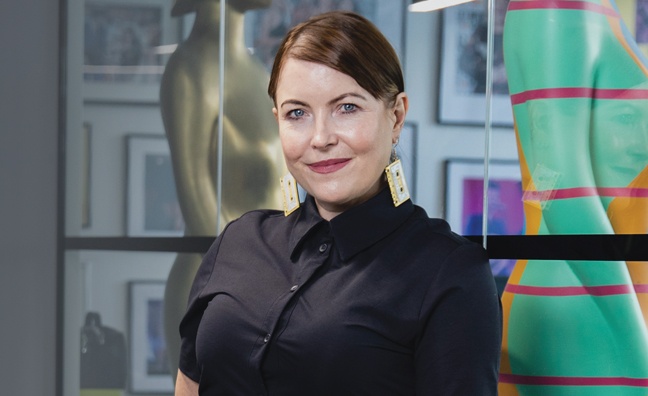In her first interview since joining from gaming body Ukie, BPI CEO Dr Jo Twist tackles key issues including AI, exports and artist breakthroughs.
Words: Andre Paine
New BPI CEO Dr Jo Twist has given her first interview since taking on the role to set out the priorities and opportunities for the UK music industry.
Twist, who was speaking exclusively to Music Week, brings experience as former CEO of Ukie, the trade body for games and interactive entertainment – a key sector for music collaboration.
“I was just really excited by the challenge that the music industry has, and the appetite that the BPI had for maybe thinking outside the box with its global members,” said Twist, who spent a decade at Ukie and was awarded an OBE for services to the creative industries.
“Music is so ubiquitous and such a part of being human,” she added. “So for me that was part of the attraction, the human creativity side and being around the most creative people in the world. Also, just supporting our members, the industry at large and the whole ecosystem to continue to be the best in the world.”
Having spent recent months meeting fellow industry leaders and attending domestic and international events, including the Music Week Women In Music Awards, Twist shared her impressions following almost a decade of market growth.
“The UK music industry is world-leading and world-beating,” she told Music Week. “It’s one of the most successful music sectors in the world. It’s the second largest exporter after the US. Our talent is responsible for almost one in 10 global streams played, but it’s also a cultural force. And the industry continues to grow, but it’s not without challenges. We face a lot of stiff competition from other territories, like South Korea and Latin America. We need to make sure that our creative talent is able to continue to thrive on that global stage.”
Since her Music Week interview, the BPI has revealed market figures showing a strong performance in 2023.
However, breakthroughs are harder to achieve, with catalogue claiming a major share of streaming. Clavish’s Rap Game Awful, Joel Corry’s Another Friday Night, Raye’s My 21st Century Blues and Mimi Webb’s Amelia led the way for UK debut LPs in 2023.
“The continued focus on breaking new talent, finding and nurturing artists, is really difficult; discoverability in such a crowded market is a challenge,” said Twist. “So helping, particularly some of our independent label members, to try and find those opportunities and to be able to thrive in the marketplace is top of people’s minds. New talent is such an important part of the ecosystem.”

Following the successful model of the BRIT School in Croydon, the BPI’s proposal for a specialist college in Bradford has been given the go-ahead, which will boost the UK’s talent pipeline.
“In my second month, we got the green light from the Department for Education,” said Twist. “I was delighted. It’s going to be a real journey over the next two or three years. Providing that opportunity to people in Bradford and the surrounding West Yorkshire area is going to be very interesting and really fulfilling.”
Twist suggested that tech and talent can be a natural pairing, particularly when it comes to building global artist engagement.
“It’s always been an industry that has embraced innovation,” she said. “But I was pleasantly surprised to see just how diverse and amazingly innovative the music industry actually is.”
The BPI’s Music & Tech Springboard Programme plays its role, by bringing start-ups closer to the UK label community.
“Music tech start-ups are really quite important as part of what we do to support the ecosystem,” said Twist. “Through our innovation programme, connecting some of those start-ups with our label members is really interesting, because there are lots of opportunities, different ways of thinking and expertise they can bring to the table. Artists don’t just generate income from one revenue source, so it’s important to look at where the opportunities are to connect with fanbases and communities. That’s something that is really interesting to learn from the games industry, about how community is such an important part of your game’s success.”
She added: “It’s really interesting to see experimentation going on in virtual worlds like Roblox and, of course, Fortnite, and the success with some of the artist performances there. People who play games also love music, they go hand in hand, and they also want different kinds of experiences. With the way in which different business models have emerged through the games industry, there are some insights we can share and bring to the music industry.”
While at Ukie, Twist admitted that she had been “jealous” of the Music Export Growth Scheme, managed by the BPI. Backed by the Department for Business and Trade and the Department for Culture, Media & Sport, MEGS funding has been expanded to £3.2 million over two years to support artists’ careers in overseas markets.
“That is amazing because it helps artists get on to that global stage and into those new territories,” said Twist.
UK Music’s This Is Music 2023 report, which drew on BPI data, revealed that export revenue hit £4 billion in 2022.
“We need to make sure that our creative talent is able to continue to thrive on that global stage,” Twist added. “Our job is to make sure that we’re working really constructively with government and policymakers, to make sure that the ecosystem, and the business and policy environment, is really supportive.”
Alongside BPI trade missions and government support for the industry, Twist suggested that more could be done to boost exports.
“We talk about the example of South Korea a lot,” she said. “Their government invests £25 million a year in the music industry. We are blessed with superstars but we need to keep our eye on the ball – the competition is creeping up. It’s important that you look at how the whole ecosystem can support those new talents, as well as talent that’s been around for a while.”
Twist noted the impact of UK artists in Spotify’s global artist rankings, including Dua Lipa, Ed Sheeran, Harry Styles, Adele and Sam Smith, as well as catalogue acts.
“We want the next generation of artists to be taking their seat, alongside The Beatles and Queen and everyone else,” said Twist. “So it’s really important that we continue to work collectively and help continue people’s journeys. Wet Leg, for instance, have been supported on their journey [including at the official UK residency at SXSW] and they continue their success. I was delighted to see them perform at the BRIT Awards this year. So it is about that whole ecosystem of support at whatever stage an act is at.”
Twist took over the BPI role – effectively the spokesperson for the UK music industry – following a 16-year stint in charge for Geoff Taylor, who has since become executive vice president, artificial intelligence at Sony Music.
The impact of the technology is top of the agenda for the BPI, as the industry grapples with the threat to rights-holders from generative AI.
“AI tools have been used in an assistive way in creativity, and particularly in music creation, for many years,” Twist told Music Week. “What we’re particularly talking to government about is generative AI, and the data that models are trained on. It’s really important that innovation goes hand in hand with human creativity and artistry.”
“We have one of the world-leading rights frameworks in this country that has enabled innovation and creativity to [work together], and therefore generate economic success and global success,” she continued. “So we’re very keen that generative AI, in particular, is given those guardrails, because the wrong policy decisions right now about artificial intelligence could have really long-term impacts on our creative industries as a whole, not just the music industry.”
Along with other organisations, the BPI has signed up to the Human Artistry Campaign, which launched at SXSW in March. With global tech leaders heading to the UK last month for the AI Safety Summit, Twist took part in a pre-summit business roundtable with the then Minister for Tech and the Digital Economy, Paul Scully.
“We’re very keen to press home to the government, and whatever government is next in power, that we must not undermine our world-leading rights framework,” said Twist. “This enables innovation and creativity, rather than undermines it. We have seen some absolutely amazing examples like the Beatles track [Now And Then, which used AI tools to clean up the recordings] and lots of different services that are using AI with permission, with compensation and with licensing in place. Anything that doesn’t do that [within the AI sector] undermines our industry.”
Another key challenge for the music industry is on diversity, an issue that Twist tackled in her previous role in gaming by establishing a census for that sector.
“It’s been heartwarming to see how diverse the music industry actually is,” she said. “On my second day, I went to a Ladies Who Rock event and I had never seen so many women at an industry event in one room and it was absolutely fantastic. As a society we obviously have a long way to go in terms of diversity, equity and inclusion, but we’ve been working really hard. We have the EJAG group [Equality & Justice Advisory Group], which is an incredibly important group of stakeholders who advise and consult with us.”
Twist continued: “We have the Diversity Task Force ‘Five Ps’ [people, policy, partnerships, purchase and progress] from UK music, which we promote and adhere to ourselves. As we know with all creativity, diversity is absolutely critical to our continued success.”
Twist suggested that further progress could be made in terms of widening industry recruitment that would also boost economic performance.
“One of the things that has always interested me in a professional and personal capacity, is how we actually crack open the industry and demonstrate the different kinds of roles [available to potential recruits] in the music industry, particularly at a label,” she said. “Being a label and what that means has to evolve and is evolving. So how we actually attract people into the roles, and how we articulate those pathways into our industry so that we can continue to be world-leading in the UK, is a real priority.”
As the BPI marked its 50th anniversary, Twist praised the efforts of her new colleagues at the trade body.
“The team’s brilliant, and I’ve been taking time in my first three months to try and meet with every single team member, as well as loads of external stakeholders, our members and the sector at large,” she said. “At the BPI, this year we celebrated our 50th year, which is as old as the games industry! I’m also the same age as the BPI. It’s done an extraordinary amount over the course of the last 50 years to put music front and centre of the creative industries, to represent the interests of labels and to start initiatives like helping to set up the BRIT School, the charts and, most recently, the BRIT Billion award.”
Looking ahead, Twist is gearing up for her first BRIT Awards as BPI boss. Changes include a new R&B category and going from five to 10 nominees for the Artist and International Artist categories, to improve representation.
“I’ve been blessed to go a few times,” she said. “It is an extraordinary event. It’s slightly daunting to be part of it formally, and not just a guest. The team who deliver the BRITs are just incredible. They put on one of the best platforms and showcases for our talent globally. It really is one of the best gigs in the world.”









